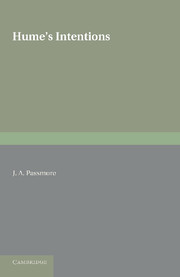Book contents
CHAPTER VI - THE ASSOCIATIONIST
Published online by Cambridge University Press: 05 June 2016
Summary
That Hume himself, even after the completion of the Treatise, thought that his associationism was his most notable achievement, he makes abundantly clear in the Abstract. ‘Thro’ this whole book’, he writes, ‘there are great pretensions to new discoveries in philosophy; but if anything can entitle the author to so glorious a name as that of an inventor,’‘tis the use he makes of the principle of the association of ideas, which enters into most of his philosophy’ (A, 31). Notice the phrase—‘the use he makes’: Hume does not claim to have invented the theory of association, but only to have discovered a new use for it—although he does, in the Enquiry, describe himself as the first who has ‘attempted to enumerate or class all the principles of association’ (E, 24); a task which, in fact, Aristotle had sought to accomplish.
It is a fact ‘too obvious to escape observation’ that ‘different ideas are connected together’ (E, 24); what Hume's predecessors had not observed, he thought, is that these associative connexions are the main source of unity and complexity both in our own minds (in so far as they unite elementary into complex passions) and in our ‘world’. ‘So far as regards the mind’, he writes in the Abstract ‘these [associations] are the only links that bind the parts of the universe together or connect us with any person or object exterior to ourselves. For as it is by means of thought only that any thing operates upon our passions, and as these are the only ties of our thoughts, they are really to us the cement of the universe and all the operations of the mind must, in a great measure, depend upon them’ (A, 32). ‘So far as regards the mind…’, ‘to us…’—in other words they are the source of all phenomenal unity, and hence, so far as Hume writes phenomenalistically, of all unity whatsoever. This is to be the most resounding triumph of the science of man. And the science of man itself makes use of associative principles, even at its most purely psychological level, because all but our elementary passions are constructed with their help.
- Type
- Chapter
- Information
- Hume's Intentions , pp. 105 - 131Publisher: Cambridge University PressPrint publication year: 2013



